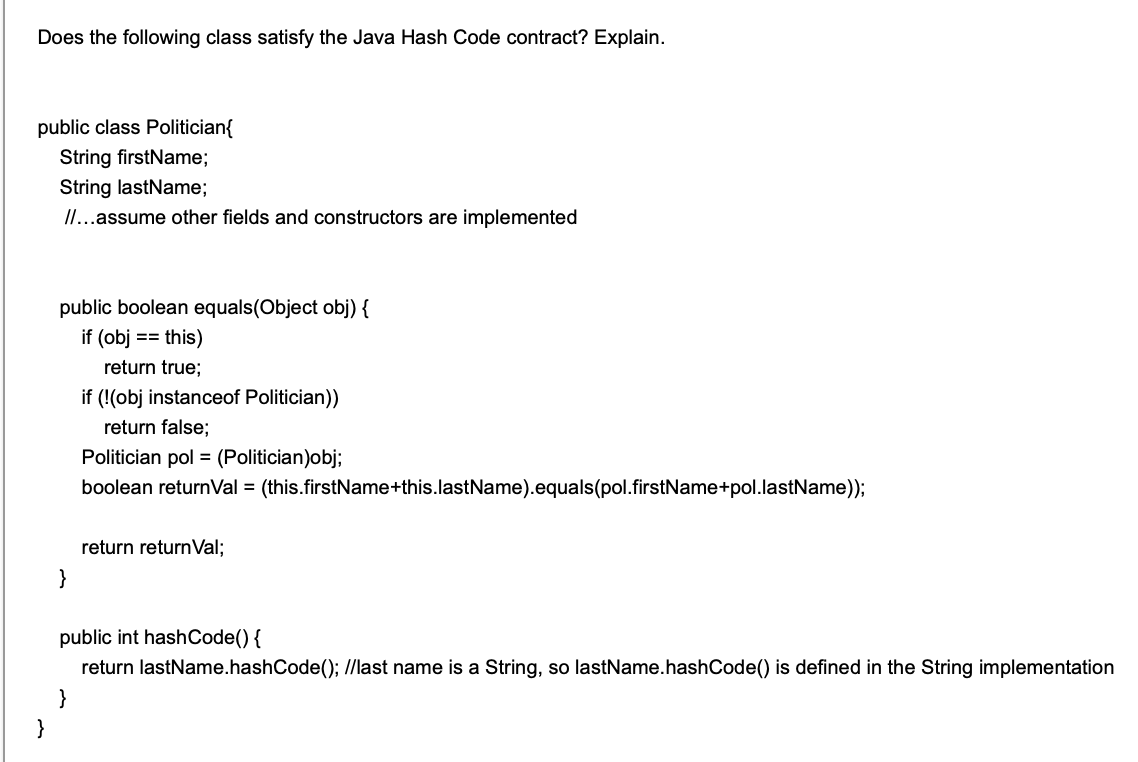Does the following class satisfy the Java Hash Code contract? Explain. public class Politician{ String firstName; String lastName; /...assume other fields and constructors are implemented public boolean equals(Object obj) { if (obj == this) return true; if (!(obj instanceof Politician)) return false; Politician pol = (Politician)obj; boolean returnVal = (this.firstName+this.lastName).equals(pol.firstName+pol.lastName)); return return Val; } public int hashCode() { return lastName.hashCode(); //last name is a String, so lastName.hashCode() is defined in the String implementatior } }
Does the following class satisfy the Java Hash Code contract? Explain. public class Politician{ String firstName; String lastName; /...assume other fields and constructors are implemented public boolean equals(Object obj) { if (obj == this) return true; if (!(obj instanceof Politician)) return false; Politician pol = (Politician)obj; boolean returnVal = (this.firstName+this.lastName).equals(pol.firstName+pol.lastName)); return return Val; } public int hashCode() { return lastName.hashCode(); //last name is a String, so lastName.hashCode() is defined in the String implementatior } }
Computer Networking: A Top-Down Approach (7th Edition)
7th Edition
ISBN:9780133594140
Author:James Kurose, Keith Ross
Publisher:James Kurose, Keith Ross
Chapter1: Computer Networks And The Internet
Section: Chapter Questions
Problem R1RQ: What is the difference between a host and an end system? List several different types of end...
Related questions
Question
java

Transcribed Image Text:Does the following class satisfy the Java Hash Code contract? Explain.
public class Politician{
String firstName;
String lastName;
/I...assume other fields and constructors are implemented
public boolean equals(Object obj) {
if (obj
this)
==
return true;
if (!(obj instanceof Politician)
return false;
Politician pol = (Politician)obj;
boolean returnVal = (this.firstName+this.lastName).equals(pol.firstName+pol.lastName));
return returnVal;
}
public int hashCode() {
return lastName.hashCode(); //last name is a String, so lastName.hashCode() is defined
the String implementation
}
Expert Solution
This question has been solved!
Explore an expertly crafted, step-by-step solution for a thorough understanding of key concepts.
This is a popular solution!
Trending now
This is a popular solution!
Step by step
Solved in 2 steps

Recommended textbooks for you

Computer Networking: A Top-Down Approach (7th Edi…
Computer Engineering
ISBN:
9780133594140
Author:
James Kurose, Keith Ross
Publisher:
PEARSON

Computer Organization and Design MIPS Edition, Fi…
Computer Engineering
ISBN:
9780124077263
Author:
David A. Patterson, John L. Hennessy
Publisher:
Elsevier Science

Network+ Guide to Networks (MindTap Course List)
Computer Engineering
ISBN:
9781337569330
Author:
Jill West, Tamara Dean, Jean Andrews
Publisher:
Cengage Learning

Computer Networking: A Top-Down Approach (7th Edi…
Computer Engineering
ISBN:
9780133594140
Author:
James Kurose, Keith Ross
Publisher:
PEARSON

Computer Organization and Design MIPS Edition, Fi…
Computer Engineering
ISBN:
9780124077263
Author:
David A. Patterson, John L. Hennessy
Publisher:
Elsevier Science

Network+ Guide to Networks (MindTap Course List)
Computer Engineering
ISBN:
9781337569330
Author:
Jill West, Tamara Dean, Jean Andrews
Publisher:
Cengage Learning

Concepts of Database Management
Computer Engineering
ISBN:
9781337093422
Author:
Joy L. Starks, Philip J. Pratt, Mary Z. Last
Publisher:
Cengage Learning

Prelude to Programming
Computer Engineering
ISBN:
9780133750423
Author:
VENIT, Stewart
Publisher:
Pearson Education

Sc Business Data Communications and Networking, T…
Computer Engineering
ISBN:
9781119368830
Author:
FITZGERALD
Publisher:
WILEY